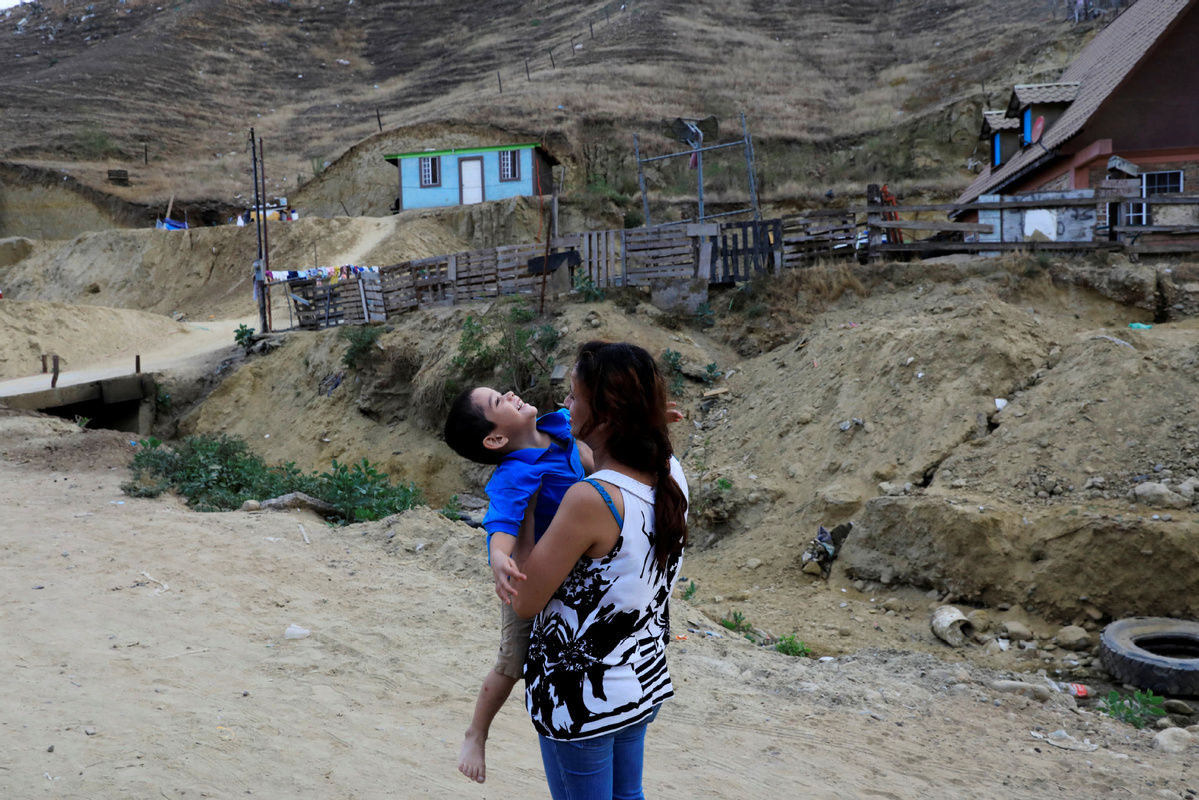


Migrant from Honduras, Dunia Ayala, carries one of her children outside a shelter after she was sent by the Customs and Border Protection (CBP) to Mexico from the US under the Migrant Protection Protocols (MPP), in Tijuana, Mexico, July 21, 2019. [Photo from Chinadaily.com.cn)
The poor human rights record of the U.S. caused by the immigration policy has been strongly criticized by the international community in recent years.
A series of data released recently have revealed how severe the situation is. In the fiscal year 2019, the U.S. government held nearly 70,000 unaccompanied migrant children in custody, up 42 percent year on year, according to statistics.
Meanwhile, court documents of the U.S. record a large number of new cases about inhumane treatment of migrant children that happened even after relevant immigration policies were halted.
A doctor who had visited a migrant child detention facility called the place a “torture facility”. As the doctor described, the children were held in cold rooms where the lights were on 24 hours a day. They had no access to toothpaste or soap. Some children fell ill and began to lose weight. To make things worse, some children died or were sexually abused while in custody.
"This is unprecedented in American history or international practice." The Economist wrote.
"We are living in a historic moment that future generations of Americans will look back on with shame," said Newsweek magazine.
Branding itself as a defender of human rights and "a city upon a hill", Washington is really obsessed with interfering in the internal affairs of other countries and accusing their domestic policies under the guise of defending human rights and protecting those countries.
Today, in the 21st century, the primitive and brutal immigration policies of the U.S. have shocked and angered the world as they deprived innocent children the happiness of being beside their parents and caused irreparable damage to their physical and mental health.
The trauma the immigration policies inflicted on migrant children by separating them from their parents is a risk caused by the state, said a U.S. federal judge.
Why is such practice, which runs counter to common sense and civilization, enjoys support in the U.S.? This has something to do with the American politics.
Family separation was rolled out under the “zero tolerance” policy. As it worked well as a deterrent to immigration, it consolidated the immigration policies, helping the policies win political favors from anti-immigration voters.
Meanwhile, children suffering from family separation could be taken as “hostages” and the mounting human rights disasters as political leverage, to serve the political interests of U.S. politicians.
Under this political logic, immigrants have been deliberately cast as culprits for the chronic problems of American economy and society, becoming a punching bag for many frustrated voters.
In recent years, immigration has become increasingly politicized in the U.S.
When the mid-term elections or general elections approach, certain American politicians invariably express concerns over the immigration issues, and raised proposals such as family separation and sending the U.S. military to the border to assist immigration law enforcement, to solve the issues.
Their goal, however, is to divert American people's focus from domestic issues.
The U.S. immigration policies, after all, are about politics. The truth does not count at all; what's important is that the political narrative could excite voters. The outcome does not matter; even it is human rights disasters. The point is that it is the political opponents who pay the price.
Obviously, it is hypocrisy and callousness of American politics that bears unshakable responsibility for such human rights disasters.
The human rights disasters in the U.S. reveal that Washington is not qualified to play the role model of human rights on the international stage, and confirm the fact that the hypocrisy and callousness of American politics is an important source of many human rights problems in the current era.
For a long time, under the guise of human rights and democracy, the U.S. has been interfering in the internal affairs of other countries and regions, supporting violent activities and trying to fish in troubled waters.
The American politicians who actively advocate intervention are motivated by nothing more than being ideological vanguard, catering to the political prejudices of certain people and making political benefits for themselves.
Their concern is not really about human rights and democracy at all, and their goals are vastly different from what they say.
It is the common practice of the U.S. to undermine human rights under the guise of human rights. The world should be more aware of this and remain more vigilant.
(Zhong Sheng is a pen name used by People's Daily to express views on foreign policy.)

 Award-winning photos show poverty reduction achievements in NE China's Jilin province
Award-winning photos show poverty reduction achievements in NE China's Jilin province People dance to greet advent of New Year in Ameiqituo Town, Guizhou
People dance to greet advent of New Year in Ameiqituo Town, Guizhou Fire brigade in Shanghai holds group wedding
Fire brigade in Shanghai holds group wedding Tourists enjoy ice sculptures in Datan Town, north China
Tourists enjoy ice sculptures in Datan Town, north China Sunset scenery of Dayan Pagoda in Xi'an
Sunset scenery of Dayan Pagoda in Xi'an Tourists have fun at scenic spot in Nanlong Town, NW China
Tourists have fun at scenic spot in Nanlong Town, NW China Harbin attracts tourists by making best use of ice in winter
Harbin attracts tourists by making best use of ice in winter In pics: FIS Alpine Ski Women's World Cup Slalom
In pics: FIS Alpine Ski Women's World Cup Slalom Black-necked cranes rest at reservoir in Lhunzhub County, Lhasa
Black-necked cranes rest at reservoir in Lhunzhub County, Lhasa China's FAST telescope will be available to foreign scientists in April
China's FAST telescope will be available to foreign scientists in April